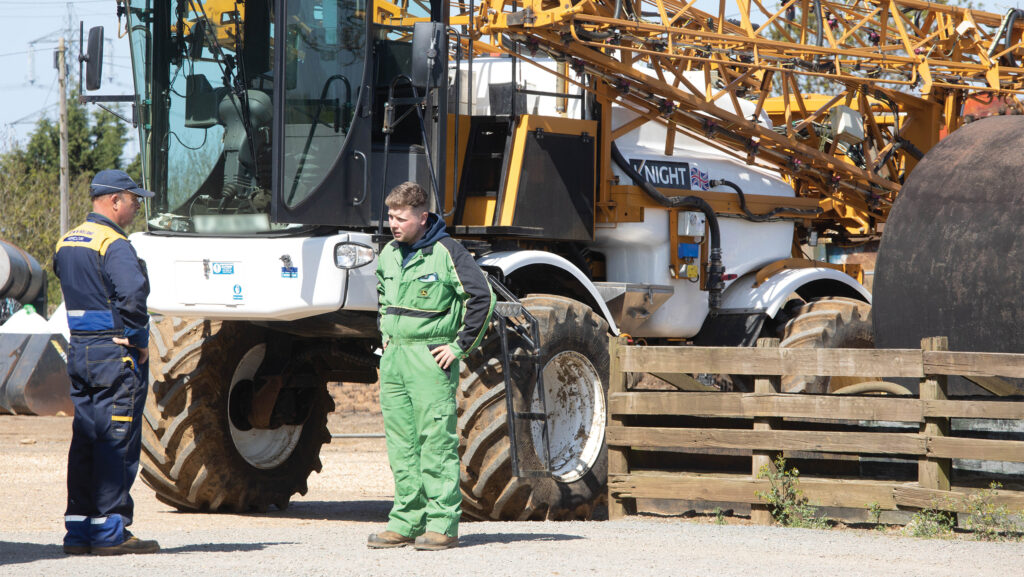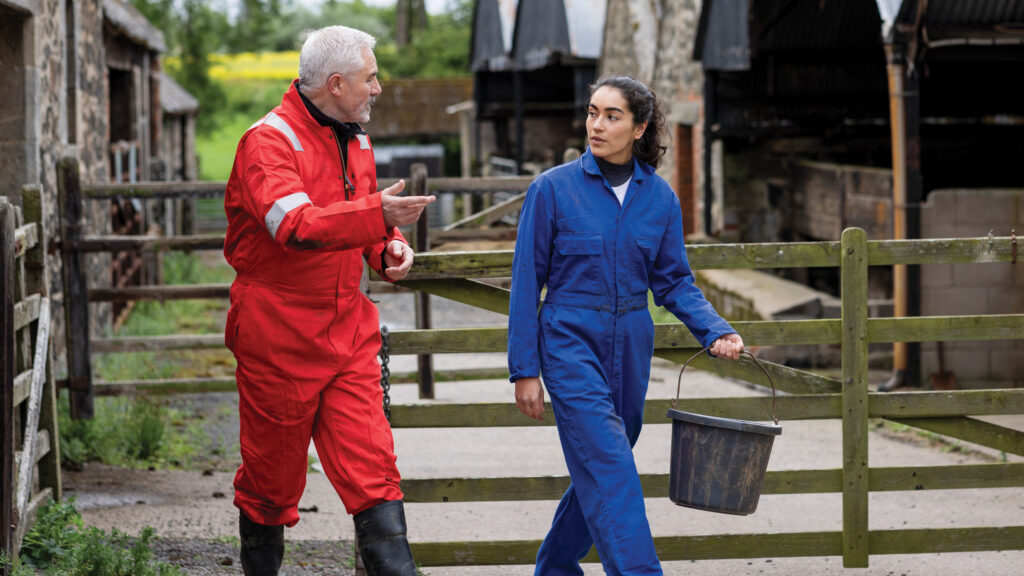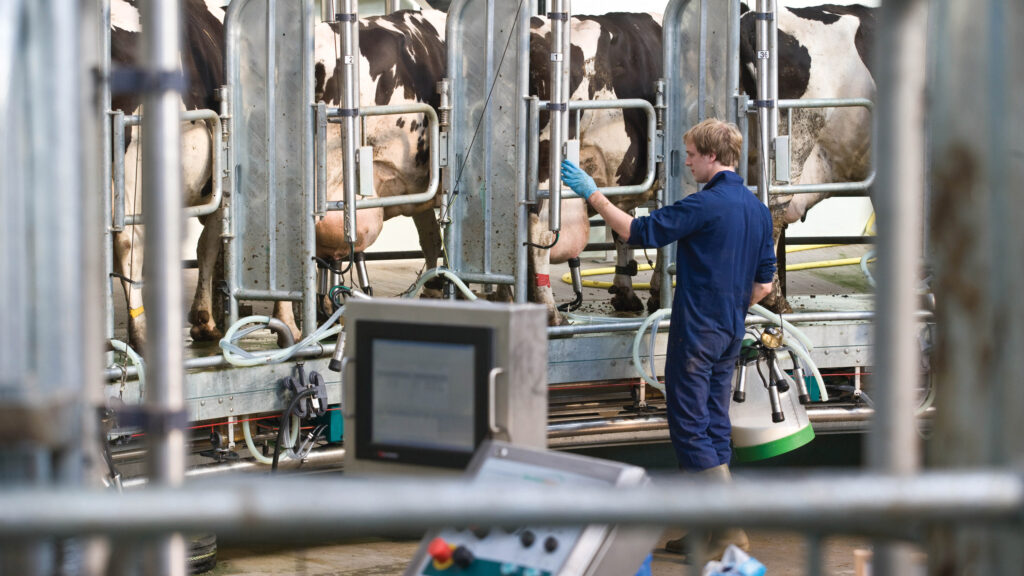Farm recruitment challenge – how structure and clarity can help
 © Tim Scrivener
© Tim Scrivener Hiring farming staff has become ever more difficult, making it all the more important that a farm’s team includes the right mix of people and that they are clear about their roles and reporting lines.
Farmers Weekly spoke to several farmers about their recent experiences in attracting staff, and while most had now found what they consider to be the right person, they were generally disappointed in the number of applicants, how short their shortlists were, and how long it took to recruit.
See also: Survey of farm managers’ pay shows 12% rise in two years
In some cases, changes in farm policy and support are the cause of people leaving the sector, especially at manager level, says Richard Price, chairman of the Institute of Agricultural Management.
Alongside this, a change in the direction of a business can prompt a move or perhaps retirement earlier than had been planned.
“Recruiting is not easy just now. Some big estate roles have come up recently and the lack of direction from the government has played a part,” says Richard, who is also farms director at Huntapac Produce, one of the UK’s largest root vegetable producers.
At all levels the pool of suitable candidates is shrinking, he says, and tempting someone away from their current role by offering more pay will not necessarily be the deciding factor for them.
“When there’s so much uncertainty, people are often not prepared to move. They may have children settled in school, for example.”
Also, if they have a partner, the location and nature of their partner’s work or other family may have a bearing on their decision.
While there are a lot of people in their mid- to late-20s well equipped with qualifications, there is a particular shortage of farm manager candidates with experience between the ages of 30 and 50, says Richard.
In any role, the structure of the business, the system and the quality of communication are key factors for a potential employee to assess, he says.
“If you’re not careful, you can go into a manager role and because of the way things work you can then find yourself being the head tractor driver or head stockperson for the next five to eight years, and that will breed frustration.
“Clarity of the job description is essential.”
It can also be challenging for a manager joining a business where the rest of the staff have been there for many years, so this needs careful thought and management by the owners of the business.

© PeopleImages/iStockphoto
What motivates staff – in order of importance?
Employee opinion
- Communication
- Training and responsibility
- Appreciation and involvement
- Job security
- Wages and remuneration
- Promotion and growth
- Good working conditions
- Mutual loyalty
- Tactful discipline
- Sympathetic help with issues
Employer opinion
- Wages and remuneration
- Job security
- Promotion and growth
- Good working conditions
- Communication
- Mutual loyalty
- Tactful discipline
- Training and responsibility
- Sympathetic help with issues
- Appreciation and involvement
Source: LKL Services survey (those in herdsperson role and their employers)
Be clear about business aims
“It’s so important that a manager gains a real clarity and understanding of what the owners of a business want – what are the business aims and objectives, and what will they be open to… and sometimes the owners don’t know what they want,” Richard says.
Clear communication is crucial, he says, and can often be lacking if there are not clear lines of responsibility.
“People need to know who is their line manager, who are they reporting to.”
That can be muddled in some large family farming businesses by the involvement of several family members, or differences in approach between those family members.
In other circumstances where there is a board, trustees or an agent, this can complicate matters for a manager and other staff, he says.
Grace Nugent, managing director of recruiter De Lacy, says some individuals are now more open to moving jobs than in the past few years.
“At one stage after Covid, and because of the war in Ukraine, people were not moving at all,” she says. “Now they are a bit more open to looking over the fence.”
At farm manager level – which is typically where De Lacy would be involved – succession pressures are creating more openings, and in some cases, roles are coming vacant because people are moving out of farming and into other sectors.

© SolStock/iStockphoto
Succession prompting change
“In the past, farming families could often rely on the next generation to pick up the baton in these circumstances,” she says.
“That’s not the case so much now and there’s much more outsourcing to fill those roles.
“We’re only at the tip of the iceberg in terms of succession planning and there’s a lot more of that to come, with a lot of emotion involved in decisions.”
Some farm managers are leaving their positions because of the change in the nature of the role, says Grace, with more technical demands, data-driven decisions and the requirement for better people management as businesses grow.
The change in the approach to sustainability is a further factor, she says.
Also, other sectors can seem more attractive because of the lifestyle. “
For example, we’ve got a massive shortage of engineers. Quite a lot have been pulled [from agriculture] to the car and construction sectors for higher wages and fewer hours.”
Lifestyle extras can help
She adds: “We have offered farm manager roles recently to good candidates but they turned them down because the holidays were not long enough.
“Extras like this can be a relatively low cost to the business, but high value to the individual. Health cover and pension terms can also help make one offer more attractive than another.”
Consider personality fit
A significant factor in some employee’s decisions to leave is personality fit.
“We get a lot of applicants who are qualified for a role and could do the job, but it’s about a lot more than that,” says Grace.
“Employers tend very much to home in on the practicality and capability aspects of an applicant, but more time needs to be spent by employers to consider how they will fit, particularly with the person they will be reporting to.”
Within that fit question, if there is a next generation likely to be following on, that needs to be given serious thought too.
Ian Lindsay is business development director at LKL Services, which recruits staff for farmers alongside its contract and relief staff services.
“It has been particularly challenging in the past few years,” he says, with demand for the firm’s recruitment service having grown over that time.
“We’re very good at talking to ourselves, but the industry never seems to get together to promote farming as a career, and it can take you all over the world.
“I think we’ve lost a lot of people at manager level to industry because of the work-life balance.”
This applies in particular to those aged under 40, he says.
The firm’s survey ranking herdsperson and employer opinions about what is important shows telling differences, with employees raking pay only fifth behind communication, training and responsibility, appreciation and involvement and job security. In contrast, employers rank pay top in their impression of what motivates staff.
However, farmers have got better at managing people in recent years, Ian says.
While there are many farm staff who work long hours and welcome overtime, the shortage of people means employers are often not able to offer the work-life balance that they would like to.
Dairy employers, for example, would be able to offer a five-day week, particularly on the better units, if there was a bigger pool of people to employ, says Ian.

© Tim Scrivener
“Compared with other countries we’ve always been understaffed. For example, in the US, it’s about 65 cows a person, across the EU it’s 85 cows and here it’s about 100 cows.
“The labour bill isn’t any more abroad, it’s just spread over more people. There are plenty of farm employers who would go to a more flexible work regime if there were the people out there.”
Identifying the right person for a role needs more thought in some cases.
“The type of person you would recruit for a conventionally milked herd is different compared to someone for a fully robotic system and this needs to be taken into account when recruiting,” he says.
Training and development is important in recruiting and keeping staff, as it is a good motivator.
“It’s always disappointing when someone good moves on, but if you have trained and developed them, it can help your reputation as a good employer.”
Recruitment and retention key points
- Communicate clearly
- Find out what really motivates candidates, what’s important to them
- Be clear about business objectives, roles and responsibilities
- Provide a clear job description
- Carefully assess the personality fit
- Take care in integrating a new employee into an established team
